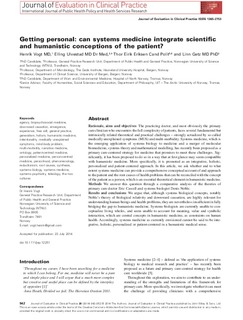| dc.contributor.author | Vogt, Henrik | |
| dc.contributor.author | Ulvestad, Elling | |
| dc.contributor.author | Eriksen, Thor Eirik | |
| dc.contributor.author | Getz, Linn | |
| dc.date.accessioned | 2015-03-04T11:35:38Z | |
| dc.date.accessioned | 2015-08-12T12:31:54Z | |
| dc.date.available | 2015-03-04T11:35:38Z | |
| dc.date.available | 2015-08-12T12:31:54Z | |
| dc.date.issued | 2014 | |
| dc.identifier.citation | Journal of Evaluation In Clinical Practice 2014, 20:942-952 | nb_NO |
| dc.identifier.issn | 1365-2753 | |
| dc.identifier.uri | http://hdl.handle.net/11250/296380 | |
| dc.description.abstract | Rationale, aims and objectives The practicing doctor, and most obviously the primary
care clinician who encounters the full complexity of patients, faces several fundamental but
intrinsically related theoretical and practical challenges – strongly actualized by so-called
medically unexplained symptoms (MUS) and multi-morbidity. Systems medicine, which is
the emerging application of systems biology to medicine and a merger of molecular
biomedicine, systems theory and mathematical modelling, has recently been proposed as a
primary care-centered strategy for medicine that promises to meet these challenges. Significantly,
it has been proposed to do so in a way that at first glance may seem compatible
with humanistic medicine. More specifically, it is promoted as an integrative, holistic,
personalized and patient-centered approach. In this article, we ask whether and to what
extent systems medicine can provide a comprehensive conceptual account of and approach
to the patient and the root causes of health problems that can be reconciled with the concept
of the patient as a person, which is an essential theoretical element in humanistic medicine.
Methods We answer this question through a comparative analysis of the theories of
primary care doctor Eric Cassell and systems biologist Denis Noble.
Results and conclusions We argue that, although systems biological concepts, notably
Noble’s theory of biological relativity and downward causation, are highly relevant for
understanding human beings and health problems, they are nevertheless insufficient in fully
bridging the gap to humanistic medicine. Systems biologists are currently unable to conceptualize
living wholes, and seem unable to account for meaning, value and symbolic
interaction, which are central concepts in humanistic medicine, as constraints on human
health. Accordingly, systems medicine as currently envisioned cannot be said to be integrative,
holistic, personalized or patient-centered in a humanistic medical sense. | nb_NO |
| dc.language.iso | eng | nb_NO |
| dc.publisher | Wiley | nb_NO |
| dc.relation.uri | http://onlinelibrary.wiley.com/doi/10.1111/jep.12251/pdf | |
| dc.title | Getting personal: Can systems medicine integrate scientific and humanistic conceptions of the patient? | nb_NO |
| dc.type | Journal article | nb_NO |
| dc.type | Peer reviewed | en_GB |
| dc.date.updated | 2015-03-04T11:35:38Z | |
| dc.subject.nsi | VDP::Medisinske fag: 700::Klinisk medisinske fag: 750::Allmennmedisin: 751 | nb_NO |
| dc.subject.nsi | VDP::Midical sciences: 700::Clinical medical sciences: 750::General practice: 751 | nb_NO |
| dc.source.pagenumber | 942-952 | nb_NO |
| dc.source.volume | 20 | nb_NO |
| dc.source.journal | Journal of Evaluation in Clinical Practice | nb_NO |
| dc.source.issue | 6 | nb_NO |
| dc.identifier.doi | 10.1111/jep.12251 | |
| dc.identifier.cristin | 1192261 | |
| dc.description.localcode | © 2014 The Authors. Journal of Evaluation in Clinical Practice published by John Wiley & Sons, Ltd. This is an open access article under the terms of the Creative Commons Attribution-NonCommercial-NoDerivs License, which permits use and distribution in any medium, provided the original work is properly cited, the use is non-commercial and no modifications or adaptations are made. | nb_NO |
